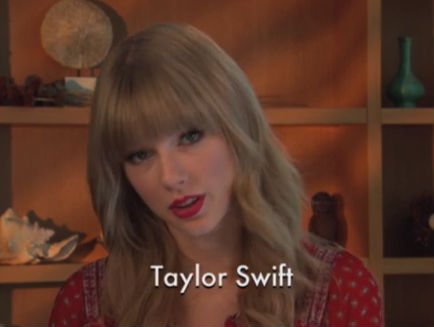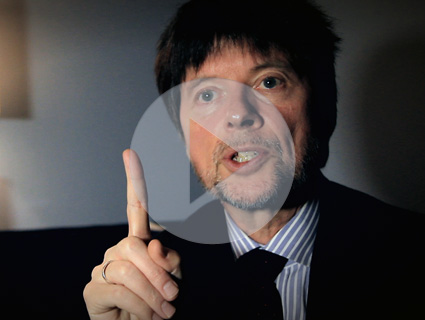Since it was founded in 1978, the Greenwood School in Putney, Vermont, has required its students to memorize and publicly recite the Gettysburg Address every year. In his new film, The Address, documentary filmmaker Ken Burns follows the students at this small, all-boys school as they grapple with internalizing Abraham Lincoln’s two-minute speech. The twist: All the kids have learning disabilities, including speech and language deficits, that make their struggles and—spoiler alert—triumphs all the more poignant.
Think of it as Ken Burns’ Spellbound. The 90-minute film, culled from three months of footage of classes, dorm life, and kids goofing off, is not a typical Burns project. Though, he explains, “You’ll know it’s a Ken Burns film: It has all the old photographs, it has the ‘Battle Cry of Freedom’ playing, but it’s something different.” Instead of enlisting actors, Burns got students at the school to narrate the film, speech impairments and all. “It’s not full-on cinema verité,” he says. “But for 320 hours of footage reduced to an hour and a half, it’s cinema verité!”
Making the film inspired Burns’ side project, Learn the Address, which is encouraging as many people as possible to learn Lincoln’s words by heart. So far, the project has collected hundreds of videos from everyday and celebrity orators.
The prolific Burns has six more films on the way. There’s The Roosevelts: An Intimate History, already “done and in the can” and coming to public television this fall. That will be followed by an adaptation of Siddhartha Mukherjee’s history of cancer, The Emperor of All Maladies, and a film on Jackie Robinson. And beyond that, there will be films on the Vietnam War, country music, and Ernest Hemingway. And he’s far from done: Burns says that when he and his team sat down to brainstorm future projects, they came up with 150 ideas. Or as Abe Lincoln might put it, seven score and 10.
The Address begins airing on PBS on April 15.
Mother Jones: When did you first memorize the Gettysburg Address?
Ken Burns: I didn’t do it until this production. We all just looked at each other and realized we were kind of honor bound to do it if we were going to make a film about it. So everybody on the crew memorized it.
MJ: So did everybody on he crew get together and recite it like the kids do in the movie?
KB: We did it periodically. We certainly did not have to do it in front of 250 people, which is terrifying. Piers Morgan asked me to recite it on the spot and my heart started pounding. I got into the third sentence and decided to punt and say, “You know, blah blah blah.” I hadn’t expected it. He knew he was putting me on the spot and said, “Nice recovery” when we went to an ad break.
MJ: It seems that the Gettysburg address is like playing Hamlet. There is no right way to do it; everyone brings something different to it. What’s your style of delivering it? Are there certain emphasis points you try to hit or a certain tone you’re going for? Or just not flopping?
KB: I think that’s the biggest thing—just not flopping. To me, the words themselves sort of dictate the delivery. And I think the boys show that at the Greenwood School. They all began to get under its spell. There’s not that kind of stentorian reverence. Lincoln wasn’t preposterously preoccupied with prepositions—”of, by, for the people”—like Raymond Massey would have you believe. I think it was “of the people, by the people, for the people.” I like the fact that he uses the word “here” so many times: “…that we here highly resolve…dedicated here…here dedicated…for those who died here.” They’re like tent stakes; they tie you in the present moment. And yet the address, whose first sentence is about the past and whose second sentence is about the present, is really about the future. It calls upon our better angels, our better selves. It’s really a remarkable piece of prose.
MJ: How did you decide to make this movie?
KB: It decided for me. I live across the river in New Hampshire from Putney, Vermont. The Greenwood School invited me to come and judge [the Gettysburg Address recital]. Obviously, I’m the Civil War guy across the river. So I went 10 years ago and wept like a baby at the heroic, the inspirational nature of these guys escaping the specific gravity of their learning differences. And I thought, “Boy, somebody should make a film, but this isn’t my style.” Finally, a few years ago I said, “I have to do it,” and put my money where my mouth is.
MJ: Memorization used to be a much bigger part of the education in the US. Would you like to see memorization make a comeback? Do you think there is any important purpose that it serves?
KB: It serves a huge purpose. We’re all sitting here wringing our hands at the sorry state of education. Everybody has got ideas: You’ve got to do STEM, and all of a sudden you’ve thrown the baby out with the bath water of humanities and arts and history. Nobody teaches civics anymore. People dismissed memorization 40 or 50 years ago as rote. It’s not that; these kids prove it’s not.
I think the fact that we have completely tossed out memorization is a huge, huge flaw. Who knows, maybe that and civics are the glue that hold everything together? Civics is in fact politics, and politics is how things work not only in the political realm but in every other realm. It may be this simple mechanical glitch that unites everything. This is my philosophy.
MJ: How do you ensure people connect with what they’re memorizing so that the Gettysburg Address doesn’t become the Pledge of Allegiance, something a lot of people recite without thinking about what the words mean?
KB: That’s gonna happen, but that is something I would risk as opposed to not having anybody memorize it. Of course people are going to be inattentive. We’re inattentive about everything—how we drive our cars, how we talk to the people we love, how we sing in church, how we sing “Take Me Out to the Ball Game.”
MJ: Any dream projects you’ve been putting off that you hope to get to in the next decade?
KB: It’s so funny, we sat down with our main coproducers and writers and came up with 150 films we would love to do. If I was given 1,000 years, I wouldn’t run out of topics in American history. It’s like the lottery with all of those ping pong balls bouncing around and you get to go, “Yes, that one!”









